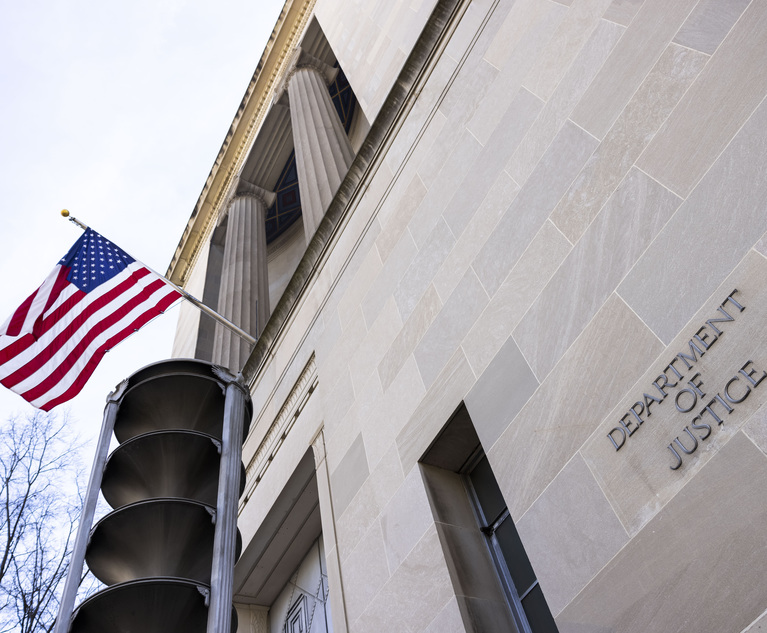 U.S. Department of Justice building in Washington, D.C, on January 12, 2022. Photo: Diego M. Radzinschi/ALM
U.S. Department of Justice building in Washington, D.C, on January 12, 2022. Photo: Diego M. Radzinschi/ALM Proving Market Realities Is Crucial in Antitrust Merger Litigation
As shown in recent cases, parties successfully have fought off merger challenges in court when they can show that the government's theoretical antitrust case is not supported by market realities. Demonstrating market realities is critical to both the government and the parties in antitrust merger litigation.
March 13, 2023 at 04:45 PM
9 minute read
Special SectionsAfter taking the reins of the Federal Trade Commission (FTC) and the Antitrust Division of the U.S. Department of Justice (DOJ), the respective heads of the Biden-era antitrust agencies promised to more aggressively investigate and block transactions based on theories that more "accurately reflect modern market realities" and capture "the rich complexity of the modern economy." But, in some cases, the agencies vigorously pursued this aggressive strategy even where the market realities did not support their theories. This approach undoubtedly achieved the agencies' desired goal of thwarting many transactions where the parties did not have the appetite or resources to engage in year-long antitrust investigations followed by complex litigation and appeals. However, as shown in recent cases, parties successfully have fought off merger challenges in court when they can show that the government's theoretical antitrust case is not supported by market realities. Demonstrating market realities is critical to both the government and the parties in antitrust merger litigation.
To enjoin a merger, the FTC and the DOJ must, like any other litigant, prove their case in court with facts. This principle is deeply rooted in antitrust jurisprudence: "'antitrust theory and speculation cannot trump facts'; the government must make its case 'on the basis of the record evidence relating to the market and its probable future.'" After a one-sided government investigation, the federal courts therefore offer the parties to a transaction a level playing field when the government seeks to enjoin a transaction. Recent merger challenges show that, despite the current political rhetoric surrounding antitrust enforcement, courts will reject the antitrust agencies' theories when they are not supported by market realities. This is most apparent when the government makes theoretical economic assumptions concerning the purchaser's incentives and competition strategies in nascent markets.
This content has been archived. It is available through our partners, LexisNexis® and Bloomberg Law.
To view this content, please continue to their sites.
Not a Lexis Subscriber?
Subscribe Now
Not a Bloomberg Law Subscriber?
Subscribe Now
NOT FOR REPRINT
© 2025 ALM Global, LLC, All Rights Reserved. Request academic re-use from www.copyright.com. All other uses, submit a request to [email protected]. For more information visit Asset & Logo Licensing.
You Might Like
View All


Law Firms Mentioned
Trending Stories
- 1Pistachio Giant Wonderful Files Trademark Suit Against Canadian Maker of Wonderspread
- 2New York State Authorizes Stand-Alone Business Interruption Insurance Policies
- 3Buyer Beware: Continuity of Coverage in Legal Malpractice Insurance
- 4‘Listen, Listen, Listen’: Some Practice Tips From Judges in the Oakland Federal Courthouse
- 5BCLP Joins Saudi Legal Market with Plans to Open Two Offices
Who Got The Work
J. Brugh Lower of Gibbons has entered an appearance for industrial equipment supplier Devco Corporation in a pending trademark infringement lawsuit. The suit, accusing the defendant of selling knock-off Graco products, was filed Dec. 18 in New Jersey District Court by Rivkin Radler on behalf of Graco Inc. and Graco Minnesota. The case, assigned to U.S. District Judge Zahid N. Quraishi, is 3:24-cv-11294, Graco Inc. et al v. Devco Corporation.
Who Got The Work
Rebecca Maller-Stein and Kent A. Yalowitz of Arnold & Porter Kaye Scholer have entered their appearances for Hanaco Venture Capital and its executives, Lior Prosor and David Frankel, in a pending securities lawsuit. The action, filed on Dec. 24 in New York Southern District Court by Zell, Aron & Co. on behalf of Goldeneye Advisors, accuses the defendants of negligently and fraudulently managing the plaintiff's $1 million investment. The case, assigned to U.S. District Judge Vernon S. Broderick, is 1:24-cv-09918, Goldeneye Advisors, LLC v. Hanaco Venture Capital, Ltd. et al.
Who Got The Work
Attorneys from A&O Shearman has stepped in as defense counsel for Toronto-Dominion Bank and other defendants in a pending securities class action. The suit, filed Dec. 11 in New York Southern District Court by Bleichmar Fonti & Auld, accuses the defendants of concealing the bank's 'pervasive' deficiencies in regards to its compliance with the Bank Secrecy Act and the quality of its anti-money laundering controls. The case, assigned to U.S. District Judge Arun Subramanian, is 1:24-cv-09445, Gonzalez v. The Toronto-Dominion Bank et al.
Who Got The Work
Crown Castle International, a Pennsylvania company providing shared communications infrastructure, has turned to Luke D. Wolf of Gordon Rees Scully Mansukhani to fend off a pending breach-of-contract lawsuit. The court action, filed Nov. 25 in Michigan Eastern District Court by Hooper Hathaway PC on behalf of The Town Residences LLC, accuses Crown Castle of failing to transfer approximately $30,000 in utility payments from T-Mobile in breach of a roof-top lease and assignment agreement. The case, assigned to U.S. District Judge Susan K. Declercq, is 2:24-cv-13131, The Town Residences LLC v. T-Mobile US, Inc. et al.
Who Got The Work
Wilfred P. Coronato and Daniel M. Schwartz of McCarter & English have stepped in as defense counsel to Electrolux Home Products Inc. in a pending product liability lawsuit. The court action, filed Nov. 26 in New York Eastern District Court by Poulos Lopiccolo PC and Nagel Rice LLP on behalf of David Stern, alleges that the defendant's refrigerators’ drawers and shelving repeatedly break and fall apart within months after purchase. The case, assigned to U.S. District Judge Joan M. Azrack, is 2:24-cv-08204, Stern v. Electrolux Home Products, Inc.
Featured Firms
Law Offices of Gary Martin Hays & Associates, P.C.
(470) 294-1674
Law Offices of Mark E. Salomone
(857) 444-6468
Smith & Hassler
(713) 739-1250







